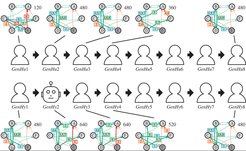Sample Project: Human–Machine Cultural Evolution
The project investigates the possibility of machine-generated culture influencing human culture.
Artificial Intelligence promises to revolutionize innovation and learning in science, business and culture. But we still do not understand the mechanisms underlying this process. This project explores the impact of AI on the processes of cultural evolution: the innovation and transmission of new ideas and behaviors.
How can human cultural evolution benefit from making use of Artificial Intelligence? Previous research has shown that AI can help humans on tasks where myopic behavior is maladaptive (Lieder et al., 2019, Brinkmann et al., 2022). In our work (Brinkmann et al., 2022), we showed that unintuitive but better-performing solutions created by AI can also be imitated by humans. This represented the first controlled experiment showing social learning by humans from AI, yet the effect was short-lived: Subsequent human learners did not adopt the superior AI strategy. Our ongoing work explores mechanisms through which machine-generated cultural artifacts may indeed persist in human populations.

Scientific writings
Brinkmann, L., Gezerli, D., Kleist, K. V., Müller, T. F., Rahwan, I., & Pescetelli, N. (2022). Hybrid social learning in human–algorithm cultural transmission. Philosophical Transactions of the Royal Society A, 380(2227), 20200426.
Key references
Lieder, F., Chen, O. X., Krueger, P. M., & Griffiths, T. L. (2019). Cognitive prostheses for goal achievement. Nature human Behaviour, 3(10), 1096–1106.
Thompson, B., Van Opheusden, B., Sumers, T., & Griffiths, T. L. (2022). Complex cognitive algorithms preserved by selective social learning in experimental populations. Science, 376(6588), 95–98.
